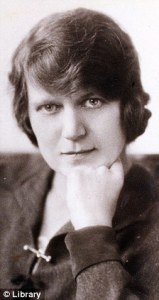You might think that I was bound to say this at some point in this blog, but The Gypsy Baby (1954) is a social comedy just waiting to be brought to life on the television screen. The novel is one of a number by Richmal Crompton which explores the behaviour of others from the perspective of a central figure who does not care about the social conventions and moral dilemmas which plague the lives of those around her. In this novel is Drusilla, a character who is not like William, but nevertheless manages inadvertently to create total chaos. She remains blissfully unaware, or so we are led to believe, of the mayhem around her.

Drusilla works for Mrs Medway, the Vicar’s wife, who notices one day that she has the look of a girl who is pregnant, and so it proves. The girl is not sure who is the father of her baby and the expected shock and horror follows immediately. There is subtle social comedy here as the Vicar’s wife’s plans to ‘help’ the girl spiral out of control; more out of control one might argue than the life of her allegedly immoral servant. Drusilla may not know who is the father of her child, but it soon becomes clear that once Mrs Medway has suggested that the child be adopted by someone in the village, she has no idea who is going to be the mother of her child either. Mrs Medway secretly wants to adopt the child herself and her reasons for wanting to do so are presented glibly as an attempt to help, but really she wants to fill the gaping hole left by her own grief at not having had children. Other women in the village also decide that the child will either help to save a failing marriage, or become the focus of a new life which will keep a grown up daughter from leaving home, or fill the gap if she does leave. In another family the apparently homeless child suddenly becomes the answer to another gap left by an older relative who is languishing in prison; they could not possibly invite him to live with them again if a small baby is occupying his room! For this family a life of immoral behaviour can be redeemed if they choose to help the mother and take in her baby, whilst the life of a wayward parent who drinks too much and resorts to crime is expendable.
In the meantime, a film director arrives with his crew to make a record of the quiet day to day lives of these moral, upstanding citizens. But who, yes, you guessed it, decides to fall in love with the pregnant girl and finds her life, or at least her physical beauty, surprisingly more interesting than anything else in the village.
Just in case the television series should ever be made, I will hold back and not tell you what happens at the end of the novel.

Drusilla has the temerity to live as she chooses to live, without plans or ambitions for the future. This lack of fear and the ability just to live in the moment might be understood as a lack of intelligence, or, if one is being more tolerant, as a lack of guile. Richmal Crompton could not possibly comment, although what happens in the end suggests that guile and the passions of a moment, whatever form this takes, can get the most conventional of people into an awful lot of trouble.
And, no, Drusilla is not a gypsy. But it is an innocent gypsy baby in the opening scene of the novel who serves as a catalyst for the decision that each woman makes as they ‘lust’ after her baby. It is almost as if this ‘other’ person, this someone from a different world who lives outside the social conventions of village life, is offering something that these women cannot achieve in any other way. This is foolish and serves the social comedy in this novel well, but I would urge any reader not to underestimate Richmal Crompton’s purpose here. Her novels tell different types of stories and she uses a number of styles and structures, but ultimately she has a serious purpose; read, listen and you might learn something, for the lives of ordinary people are never quite what they seem. I will discuss this aspect of her writing further in forthcoming posts.

